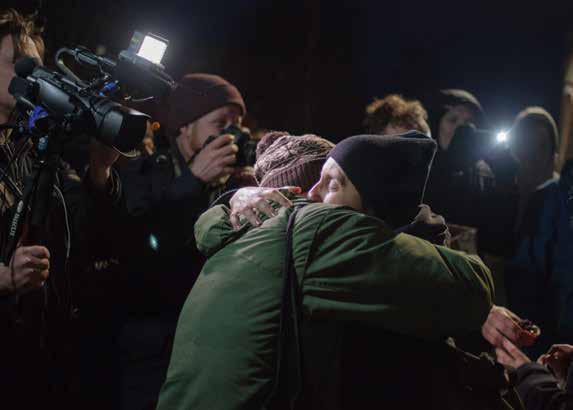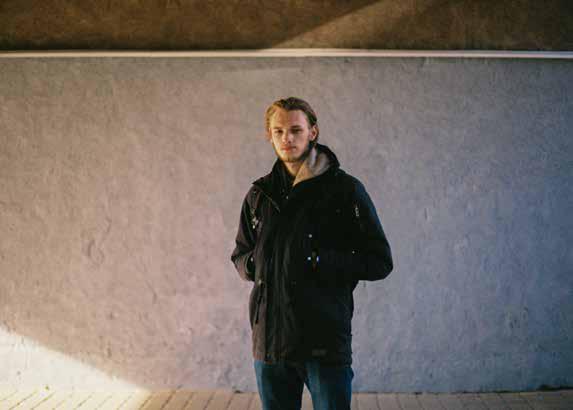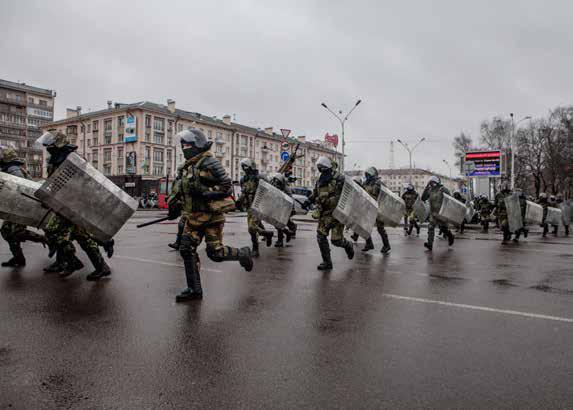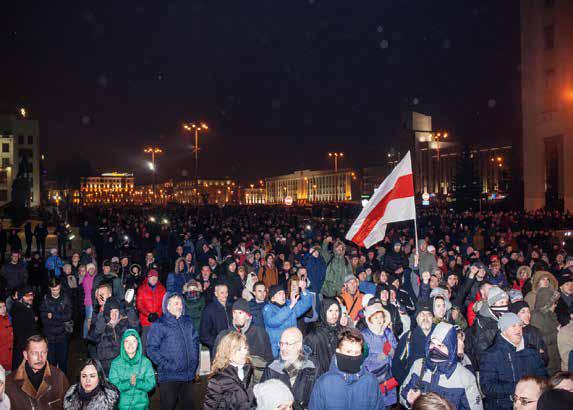Maxim Sarychau
The Only Constant is Change
The expression of discontent is part of the perpetual balancing of interests between the ruling apparatus and the general public. However, the political regime of Alexander Lukashenko supresses the manifestations of the Belarusian public, resulting in the erosion of the society and its continual pursuit of change. Politically motivated arrests, police interventions even during officially sanctioned protests and other undemocratic proceedings disintegrate the civilians’ collective power, undermine individuals’ belief in their impact and affect their internal state of freedom.
Maxim Sarychau’s (1987) socially engaged projects, created in public spaces and in direct interaction with the people affected by the regime, invoke empathy as well as social self-reflection. Along with capturing the protests in the Belarusian capital in his photographic series Cold Spring (2017), Sarychau adds the value of personal stories, which provides this divided society with a much-needed missing element. Photographs of the protests at squares in Minsk are interweaved with portraits of the arrested remonstrants while his website also includes interviews with detainees about their authentic experiences. This documentation, together with Sarychau’s photographs of relatives of prisoners’ waiting for their release and the activity of civil rights organisations, elicits solidarity and helps build civic integrity.
The photographer’s project focuses on machinations of a state that shows no moral responsibility towards its citizens; on the contrary, it employs non-transparent tactics, intimidation and political influence so as to maintain power and suppress opposing voices. Protesters are often preventatively detained, not only by police during actions or ‘riots’ but also by law enforcement officers in plainclothes as the remonstrants are on their way home. One of the harshest dispersals of the activist meetings took place on Freedom Day. Where does the absurdity of untouchable authorities end, and what can a citizen do against their power? The unbalanced battle provokes anarchistic behaviour, and people’s rebellion acts as an antidote against the dictatorial authoritative manners. However, the state unfortunately uses this to justify the interventions, leading to a vicious circle.
The theme of fear and danger was also the subject of Sarychau’s exhibition Blind Spot, presented in Kasárna Karlín in Prague at the end of 2018. In the form of photographs, graphics and objects that have a quality of conceptual art, the artist critiques the indefeasible practices of state authorities and their extreme manifestations of power, even brutality, which move between the limits of law and injustice. These mechanisms of maintaining control happen alongside targeted prevention of social interaction, resulting in the feeling of isolation and disintegration of the community.
The society’s frame of mind is reflected in the opinions of young people. Voices of Generation L is a series of portraits and monologues of the succeeding generation that has grown up with Lukashenko; the youth has therefore never known Belarus other than under Lukashenko’s rule. The important question is whether this generation is willing to fight for a change and whether they want a change at all. Their viewpoints are indeed very contradictory. Sarychau creates a three-dimensional portrait of the young generation and provides space for a democratic heterogeneity of opinions. Some see the situation critically and their statements show a glimmer of hope. However, some also feel great scepticism and do not believe in the possibility of doing anything about the given system because they see that protests usually end with the arrest of participants, or even their dismissal from school or work. Therefore, many primarily wish for stability. They all face an important decision. They feel responsibility for their country, but sometimes simply only for themselves. Many want to find a place for their own lives and think that leaving their country is the only solution. Since many are students, who will remain to turn things around?
Sarychau’s practice combines a documentary approach with an activist aspiration to change the current state of affairs. He sides with the citizens and at the same time gives room to contrasting and ununified opinions, as it is the only way to start a discussion. Such effort is helping catalyse a search for common goals and found a liberated mentality. Although Maxim Sarychau reflects on the government’s cruelty and how it does not allow for open and public disagreement, this particular information ought not to be the ultimate message arising from Sarychau’s documentary projects. On the contrary, the Belarusian artist strives to bring people to a way of thinking that will lead to collectiveness and finding the decisive moment to have the last word as citizens.











#33 investigation
Archive
- #45 hypertension
- #44 empathy
- #43 collecting
- #42 food
- #41 postdigital photography
- #40 earthlings
- #39 delight, pain
- #38 death, when you think about it
- #37 uneven ground
- #36 new utopias
- #35 living with humans
- #34 archaeology of euphoria
- #33 investigation
- #32 Non-work
- #31 Body
- #30 Eye In The Sky
- #29 Contemplation
- #28 Cultura / Natura
- #27 Cars
- #26 Documentary Strategies
- #25 Popular Music
- #24 Seeing Is Believing
- #23 Artificial Worlds
- #22 Image and Text
- #21 On Photography
- #20 Public Art
- #19 Film
- #18 80'
- #17 Amateur Photography
- #16 Photography and Painting
- #15 Prague
- #14 Commerce
- #13 Family
- #12 Reconstruction
- #11 Performance
- #10 Eroticon
- #9 Architecture
- #8 Landscape
- #7 New Staged Photography
- #6 The Recycle Image
- #5 Borders Of Documentary
- #4 Intimacy
- #3 Transforming Of Symbol
- #2 Collective Authorship
- #1 Face
